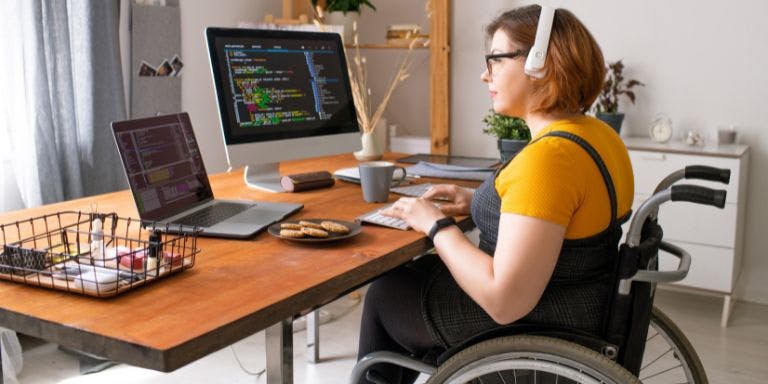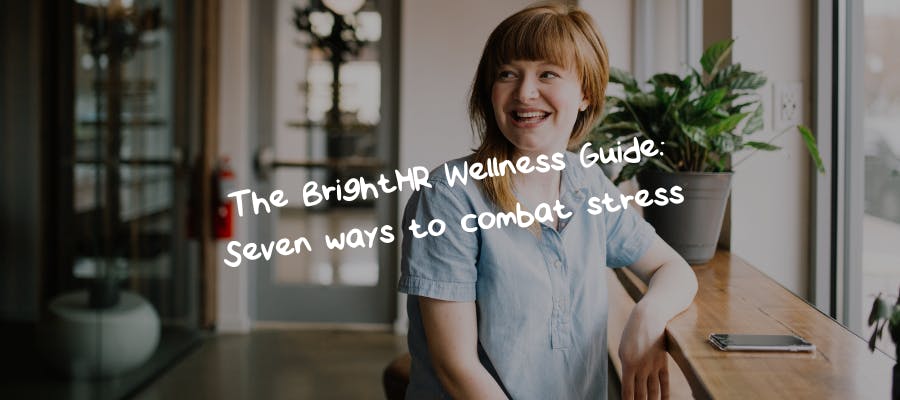First published on Wednesday, August 3, 2022
Last updated on Thursday, April 11, 2024
Mental health issues such as stress and anxiety are among the main reasons for staff to take time off of work. A recent survey by Statistics Canada found that at least 20 per cent of working Canadians experience very high levels of work-related stress.
No matter your industry, a bad day can be challenging and interfere with productivity, morale, and that all-important work-life balance.
That's why our expert team have put together a list of seven mindfulness and wellness exercises to help you get rid of stress in the workplace.
Simply send these over to your team and encourage them to take their pick of what to try.
Seven stress control techniques
1) Muscle relaxation
It may seem a bit obvious to say that relaxing is a good way to combat stress. But it isn’t quite as easy as it seems.
When you’re stressed, you tense up, especially around the back, shoulders, and neck. Progressive muscle relaxation techniques, where you focus on one set of muscles at a time by tensing and then relaxing them, can work to relax your whole body and your mind. Start with one foot, tense the muscles. Relax them. Move on to the other foot. Then your legs, thighs, hips, stomach, chest, back, neck, shoulders, and face.
A five-minute break or your lunch period is a great time to try this. Forget about the workload, if only for a moment, and focus solely on the set of muscles that you’re stretching. The more you do this, the more you’ll be able to feel when your muscles are tense and when they aren’t.
It’s a great preventative measure to fight stress—and keep yourself limbered up and comfortable in the office.
2) Deep breathing
Deep breathing is a quick, free, and easy way to calm your mind. The best thing about this method is that you can practice it anytime, and it only takes a moment or two out of your day. The more you work to make it a habit, the more natural it becomes.
Sit back in a comfortable chair, keep your back straight, and start to breathe in through your nose. Hold your breath for just a few moments, then exhale through your mouth. This is a basic breathing technique that’s absolutely perfect to beat little spots of stress before they get out of hand.
Don’t forget to focus on each breath, in and out, and feel the air entering and exiting your body.
3) Get creative
The urge to doodle or scribble can be overwhelming when we’re feeling anxious at work. Have a notepad at your desk, just for quick moments when you need to scribble.
You might just need to draw a heart or colour in half of a checkerboard, but your concentration will drift from your tasks and to your doodle for a few seconds, and you’ll regain energy. If you’re at a desk or typically stationary, doodling, scribbling or even a bit of colouring can be a great way to invigorate yourself.
Other creative outlets at work, such as listening to music (if the office allows it) are equally effective techniques to destress.
4) Laugh
A quick chat is one of the simplest ways to combat stress. A joke or casual conversation can do a lot to improve your day-to-day. It all comes down to laughter.
Laughing can soothe tension. It increases the number of endorphins released by your brain, and it can help you form friendships with your colleagues.
It’s hard to feel angry, sad, or anxious when you’re laughing.
5) Meditation
Different types of meditation work for different people, and as with most de-stress techniques, there isn’t a right or wrong way to take the time to relax. We suggest basic mindfulness as a starter technique.
Take five or ten minutes out of your day and forget about the to-do list. Focus only on what is going on right now. The rest leads on from technique No.2 on Deep Breathing.
Find a comfortable chair, keep your back straight, close your eyes and think about your breathing. Concentrate on the sensation of air flowing into your nose, and out of your mouth.
Once you’ve done this, try to slowly become aware of sounds, thoughts, and sensations. If you lose control of your thoughts and workplace stress gets in, start again, and focus on your breathing. Repeat. Meditation can slow your heart rate and help to restore your focus on the tasks ahead.
6) Exercise
For some people, a gym session before or after work is their way of burning stress. Unfortunately, during office hours you can’t just pop out to the leisure centre for an hour.
At BrightHR, we encourage staff to take five if they feel the need. A five-minute walk outside not only gives you chance to get some fresh air, but the rhythm of walking can help you to forget about your feelings of anxiety.
It can be particularly helpful to go for a walk with a colleague. Make a rule where you don’t talk about work. You’ll be laughing and smiling in no time as you explore new surroundings, away from the workplace.
7) Take a visual vacation
We all daydream, right? All of a sudden, a thought comes into your head and five minutes later you snap back into the office with no idea where the time went. It’s a key sign that your brain needs a little break, and can be harnessed, knowingly, to do exactly that.
Sit back. Close your eyes.
Picture your favourite place to be. Whether it’s on a beach, in bed at home, or in a beer garden…
Think about it, visualize it. Engage your senses. What are you looking at? What smells are there? What objects are there to touch? If this is your favourite environment, you’ll find it uplifting and relaxing.
Doing this for a few minutes a day can help to relax your mind and body. It invigorates and energizes too, giving you a great spark to take on the rest of the day.
Need advice on employee management?
BrightHR is here to help. Our BrightAdvice is a confidential helpline that gives employers unlimited round-the-clock access to expert advisors for clear, practical, and jargon-free advice.
This dedicated helpline saves you time and the trouble of Googling answers to important and sensitive HR questions. To learn more, call us at (1) 888-220-4924 or book a free demo today.






